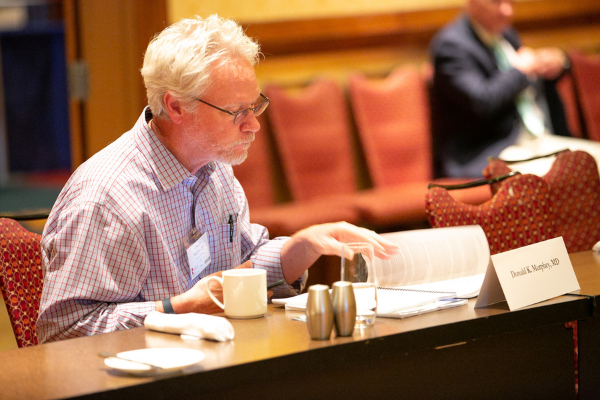
This is the first in a series of TMA member profiles showing how COVID-19 has shaped Texas physicians, their patients, and the practice of medicine. Have a story to share? Email Joey Berlin.
Recently, a colleague asked Donald Murphey, MD, what his “favorite diseases” were to deal with as a pediatric infectious disease expert.
COVID-19 did not make his list.
“They’re the ones where you kind of know what’s going to happen, and you know the background, and you’re comfortable with how to treat them. And even if things are not quite right, you know how to adjust,” said Dr. Murphey, a pediatric infectious disease specialist at Dell Children’s Medical Center in Austin and a member of the Texas Medical Association’s COVID-19 Task Force.
He added: “With COVID, I think everybody feels a little bit insecure that we know some about it, but we don’t know everything, and it’s continuing to evolve. So it’s unpredictable, and we don’t like chaos.”
The chaos caused by COVID-19 ebbs and flows with each new variant and has hit yet another high-water mark with the spread of omicron, he says. While the disease’s effect on individuals remains unpredictable, COVID-19’s impact on the medical world has taken on a dismally predictable rhythm.
“We fear a new wave, we see a new wave, we get stressed out with a new wave, we get to the peak, and then see it coming down, and then we see it gets better – but we’re still busy for many, many months,” Dr. Murphey said. “We feel some relief and then hope for the best. And then it’s very difficult when that whole cycle starts over again.”
That cycle can be disheartening, “and yet we’re happy to come to work every day and take care of kids,” Dr. Murphey said.
No other disease he’s dealt with has required so much focused attention over such a long period.
“It’s a new problem so you have to learn about it,” he said. “I have been reading, listening, talking about COVID continuously for, in March [it will be] two years. There is, every day, news that I need to know about omicron and virology and epidemiology and public health intervention and mitigation. The drugs have changed, the preventive treatments have changed. There’s just new questions all the time.”
COVID-19 has had a profound effect on pediatricians – just like other physicians – because of the on-the-fly adaptations they’ve had to make to keep practicing in an unprecedented situation, Dr. Murphey says. And while pediatric hospitals have not seen the sheer number of COVID-19 cases other hospitals have faced, they typically have fewer beds and are easier to fill up.
“We have not been as overwhelmed as adult care, but we have been very busy, and we’ve had the [intensive care unit] full and multiple kids on ventilators and just kind of been at our wit’s end,” he said.
On the bright side, most parents have understood that combating COVID-19 is a fluid situation and that today’s best medical advice may be replaced tomorrow with something else based on better science.
“People are still very appreciative that you are listening and studying and getting the best information,” he said. “For the [parents of the] kids I take care of in the hospital, that’s not an issue for them. They want the best care.”
And besides the disease itself, he’s had to learn about and help families cope with other negative consequences of the pandemic such as the psychological impact closing schools has on kids.
Dr. Murphey looks forward to the day when he can do simple things like attend a concert or go see his elderly mother without having to worry about how COVID-19 might affect his plans. And after two years of staying off airplanes and making short car trips, he would like to travel more again.
One of medicine’s top priorities in the coming years will be reviving the credibility of public health, which has become a political punching bag during the pandemic, he says.
“We have beaten up on public health people at exactly the time when we needed them, and I think that’s just unfortunate and sad,” he added. “It’s going to keep us from having a healthy community until we deal with that and hopefully reestablish respect for public health.”